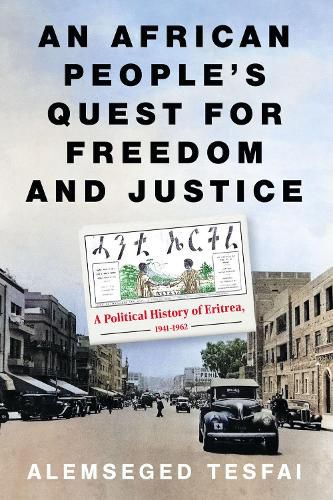Readings Newsletter
Become a Readings Member to make your shopping experience even easier.
Sign in or sign up for free!
You’re not far away from qualifying for FREE standard shipping within Australia
You’ve qualified for FREE standard shipping within Australia
The cart is loading…






Like its African neighbours, Eritrea attained colonial statehood under a European power, in this case Italy. Yet, during decolonisation, its people were singularly excluded from the right to self- determination, for external reasons: superpower rivalry over the country's strategic position on the Red Sea; a mistaken notion of irreconcilable sectarian differences within Eritrea's population, invoked in order to brand it a society unfit for statehood; and Ethiopia's imperial claim, based on mythical historical connections.
The Ethiopian call for Eritrea's return, supported by the UK and the US, sealed its fate at the international level. First, in the early 1950s, the UN General Assembly federated Eritrea as an autonomous unit under Ethiopian sovereignty; a decade later, Addis Ababa annexed it as a province in neither case was the population consulted, sparking a liberation war.
This vital book traces the genesis of the Eritrean independence struggle through hitherto unexplored local sources, both written and oral, analysed against the rather scanty existing literature on this period. Alemseged Tesfai refocuses the narrative on the actions, reactions and expectations of a relatively small nation, in both size and population, as it set out to right an international wrong, imposed by the Great Powers of the day.
$9.00 standard shipping within Australia
FREE standard shipping within Australia for orders over $100.00
Express & International shipping calculated at checkout
Like its African neighbours, Eritrea attained colonial statehood under a European power, in this case Italy. Yet, during decolonisation, its people were singularly excluded from the right to self- determination, for external reasons: superpower rivalry over the country's strategic position on the Red Sea; a mistaken notion of irreconcilable sectarian differences within Eritrea's population, invoked in order to brand it a society unfit for statehood; and Ethiopia's imperial claim, based on mythical historical connections.
The Ethiopian call for Eritrea's return, supported by the UK and the US, sealed its fate at the international level. First, in the early 1950s, the UN General Assembly federated Eritrea as an autonomous unit under Ethiopian sovereignty; a decade later, Addis Ababa annexed it as a province in neither case was the population consulted, sparking a liberation war.
This vital book traces the genesis of the Eritrean independence struggle through hitherto unexplored local sources, both written and oral, analysed against the rather scanty existing literature on this period. Alemseged Tesfai refocuses the narrative on the actions, reactions and expectations of a relatively small nation, in both size and population, as it set out to right an international wrong, imposed by the Great Powers of the day.